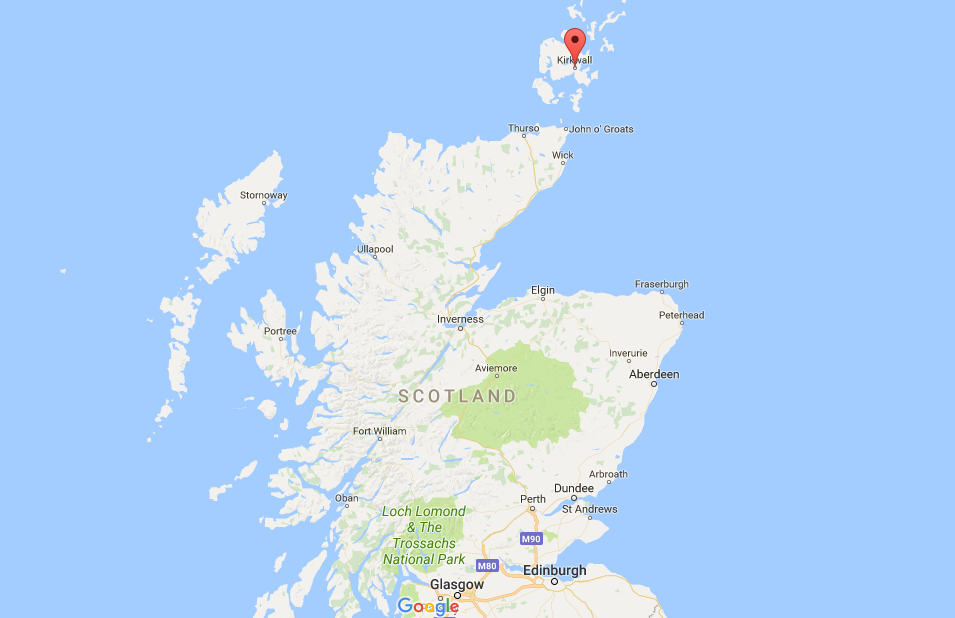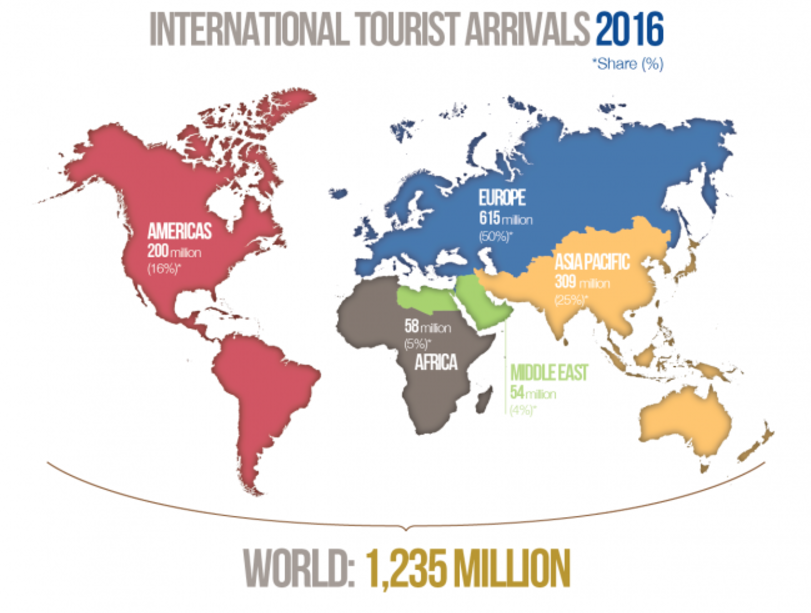This rising opposition to an industry that has fuelled development is now spreading across Europe where a growing concern over the impact of increasing arrivals is pushing locals to stand up against visitors and a wave of anti-tourism protests have been taking place across many of Europe's most popular destinations.
This probably is most evident in the Catalonian city of Barcelona where anti-tourist groups have been reported for slashing car tyres and breaking windows at some of the city's finest hotels. In recent weeks locals took to the beach of La Barceloneta to complain against the drunken exploits of visitors.
Similar protests have been seen across Spain in Palma on the Balearic island of Mallorca and San Sebastián in the mountainous Basque Country. Militant groups have published images and videos on social media channels, showing buildings defaced with anti-tourism graffiti messages such as "Tourism kills the city" and "Tourists go home".
CHART - Annual Visitor Arrivals in Spain (2015 - 2017) Source: CAPA - Centre for Aviation & Spain's Ministry for Industry, Energy and Tourism and Instituto Nacional de Estadistica
Source: CAPA - Centre for Aviation & Spain's Ministry for Industry, Energy and Tourism and Instituto Nacional de Estadistica
Spain has been the focal point for this rising so called 'tourism-phobia'. That is no surprise when you consider the nation saw a record 75.6 million tourist arrivals last year, around a quarter of them from the United Kingdom, but the issue spreads much further afield with recent anti-tourism protests being recorded in Milan, Rome and Venice in Italy; Dubrovnik and Hvar in Croatia; and Corfu in Greece.
In some of these cities, particularly Dubrovnik, the 'problems' are caused by an influx of tourists from arriving cruise ships. Even some of the smaller communities in Europe are being hit by the sudden influx of visitors a cruise ship can deliver.
For example the small Scottish town of Kirkwall is due to welcome 140 cruise liners during this year's summer season (April - September) with up to 130,000 visitors expected from the berthing ships. This is six times the population of the entire Orkney archipelago, which lies about ten miles off Scotland's northern tip and locals are already arguing that over-tourism is killing the quiet town's character.
MAP - Kirkwall, Orkney, where cruise ship visitor arrivals have quadrupled since the start of the decade Source: Google Maps
Source: Google Maps
The United Nations World Tourism Organisation (UNWTO) has defended the sector, calling on local authorities to do more to manage growth in a sustainable manner. Sustainable tourism strategies are not new. After all, the industry learnt quickly to deliver manageable numbers after the high-rise hotel revolution in the 1960s in the likes of Torremolinos, a Mediterranean resort town on the Costa del Sol, close to Malaga in Andalusia in southern Spain and Benidorm, a seaside resort on the eastern coast of Spain, part of the Valencia region's famed Costa Blanca.
But it is becoming clear that balance is now weighing more heavily on the local communities as destinations have looked more closely on the obvious economic benefits that tourists can bring. This is clearly evident with the demonstrations in Venice where recently around 2,000 of the 55,000 local residents marched through the city in anger at rising rents and the impact of huge cruise ships and the pollution they cause to the city's delicate environment. More than 20 million tourists visited the famous city last year.
The UNWTO secretary general Taleb Rifai acknowledges that tourism growth comes with responsibility and to ensure that tourism is an enriching experience for visitors and hosts alike demands strong, sustainable tourism policies and the engagement of all - national and local governments and administrations, private sector companies, local communities and tourists themselves.
However, he believes 'tourism-phobia' on the part of citizens is "largely unjustified" with the wrongdoing of illegal companies, damage to marine and terrestrial ecosystems or misbehaviour of a small number of travellers not representing a dearth of tourism ethics by the sector as a whole.
"Growth is not the enemy. Tourism growth leads to economic prosperity, jobs and resources to fund environmental protection and cultural preservation that would otherwise not be available. It also means that through meeting others we can broaden our horizons, open our minds and our hearts, improve our well-being and be better people," he says.
As an economic activity, travel and tourism is relatively young; yet it has become a sector central to our societies. Today, tourism generates 10% of the world's GDP, 1 in every 10 jobs and 7% of world trade and has become key to many countries' balance of payments. The number of international tourist arrivals grew by nearly 4% to 1.2 billion in 2016 and is predicted to grow between 3-4% this year.
CHART - International tourist arrivals (2016) Source: United Nations World Tourism Organization (UNWTO)
Source: United Nations World Tourism Organization (UNWTO)
Latest data shows international arrivals in Europe (+6%) rebounded over the first four months of 2017 after mixed results last year, as confidence returned to some destinations that were impacted by security incidents, while others continued to grow strongly. Results improved particularly in Southern Mediterranean Europe (+9% as compared to +1% in 2016) and Western Europe (+4% as opposed to +0% in 2016). Northern Europe (+9%) continued to record strong growth, while Central and Eastern Europe recorded 4% more international arrivals, in line with results of last year.
But a sustainable tourism strategy that promotes environmental preservation and protection of tangible and intangible heritage, but also engagement, commitment and respect for local communities is essential to safeguarding the future of the industry. Managing the growing number of visitors to many popular areas of our planet, including cities, is crucial for both hosts and visitors - both domestic and international arrivals.
"The sector needs regulation, but not regulation that curbs its growth," says Mr Rifai. "Rather, regulation that ensures its sustainable management - actions that help diversify visitor activities; effective, holistic and integrated mechanisms to manage visitors at sites; policies to reduce seasonality; and incentives for the private sector to invest in new areas and products, and to reduce energy and water consumption."
"We can and should be able to continue capitalising on the sector and its benefits in terms of job creation, economic development and cultural interaction, while curbing its negative effects and impacts. Together we can continue building a sustainable, equitable and well-managed tourism sector that supports many livelihoods around the world and can enrich us every time we cross borders and exchange culture," he adds.
CAPA - Centre for Aviation delivers 400+ CAPA News Briefs daily, visit centreforaviation.com to find out more.
The perceived over-tourism in Europe has been a symptom of the threat of terrorism in north Africa which has also led to an increase in tourists holidaying in the Mediterranean over the past two years. The UNWTO recommends a number of proven methods for managing crowds in destinations, such as encouraging tourists to visit beyond the central sights, diversifying tourist activities, reducing seasonality and, importantly, addressing the needs of the local community.
A change in holiday habits means people are increasingly taking additional shorter city breaks in Europe, driven by lower air fares and the rise of platforms such as Airbnb. An increase in popularity in cruising has also exacerbated the issue delivering a larger density of arrivals and traffic that mainly focuses on visiting local city centre sites.
The focus should not be, according to the UNWTO, on simply stopping tourists arriving, but managing them better at destinations. Tenerife in the Canary Islands is only permitting the construction of high-end hotels as it seeks to diversify its accommodation offering and reposition the destination; Venice in Italy is banning all new tourist accommodation in the city centre and will monitor overcrowding issues at prime sites; and Amsterdam already encourages visitors to stay in properties outside of the city centre and employs a 'tourist tax' on all accommodation.
Meanwhile, the Croatian party island of Hvar and the long-popular Magaluf resort on the Spanish island of Mallorca have pledged to put an end to debauchery by tourists by introducing huge fines for inappropriate behaviour.
Barcelona, the focus of the recent 'tourism-phobia' is also cracking down on tourist accommodation which must be licensed and approved by the council. A new law passed in January limits the number of beds available and freezes the building of new hotels in some zones of the city.
There will always be a fine line balancing the economic, environmental and social benefits and costs of tourism, but for a sector that accounts for as much as 12% of GDP in a major city like Barcelona, a sustainable strategy for the future has to be found.